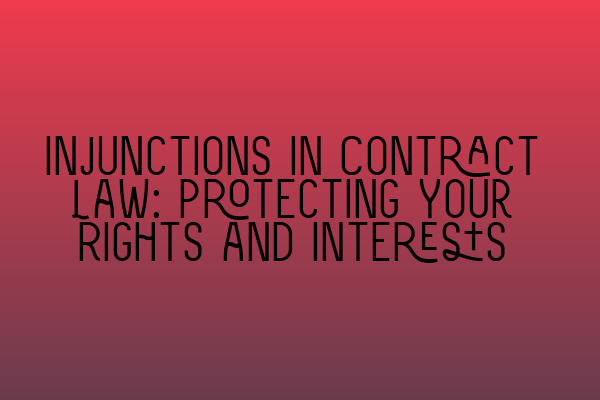Injunctions in Contract Law: Protecting Your Rights and Interests
When entering into a contract, it is essential to understand your rights and the legal tools available to protect your interests. One such tool is an injunction, a powerful remedy that can be sought to prevent or stop a party from engaging in certain actions that would harm your rights under the contract. In this article, we will explore the importance of injunctions in contract law and discuss how they can help safeguard your contractual rights.
What is an Injunction?
An injunction is a legal order issued by a court that requires a party to either do something or refrain from doing something. In the context of contract law, an injunction may be sought when one party believes that the other party is acting in breach of the contract or is about to breach its obligations. By seeking an injunction, a party can effectively stop the other party from taking actions that would harm their contractual rights and interests.
It is important to note that injunctions are typically only granted when there is a serious threat of irreparable harm or when monetary damages are insufficient to adequately compensate the injured party. The court will carefully evaluate the circumstances and consider factors such as the likelihood of success on the merits, the balance of convenience, and the public interest before deciding whether to grant an injunction.
The Different Types of Injunctions
Injunctions can be categorized into two main types: prohibitory injunctions and mandatory injunctions.
Prohibitory Injunctions
A prohibitory injunction is the most common type of injunction sought in contract law. It is designed to prevent the party in breach from continuing or commencing actions that would violate the terms of the contract. For example, if one party is contractually obligated to refrain from disclosing confidential information, a prohibitory injunction can be sought to prevent them from doing so.
Prohibitory injunctions are particularly useful in situations where irreparable harm would be caused if the other party were allowed to continue with the breach. These injunctions effectively restrain the party from taking any further actions that would be detrimental to the rights and interests of the injured party.
Mandatory Injunctions
In contrast to prohibitory injunctions, a mandatory injunction requires the party in breach to take specific actions to fulfill their contractual obligations. This type of injunction is less common in contract law but may be sought when the injured party believes that monetary damages would not adequately compensate for the breach, and specific performance is necessary to protect their interests.
For example, if a party fails to deliver goods as agreed upon in the contract, the injured party may seek a mandatory injunction to compel them to deliver the goods as specified. The court will consider factors such as feasibility and the availability of alternative remedies before granting a mandatory injunction.
The Benefits of Seeking an Injunction
When facing a breach of contract, seeking an injunction can provide several benefits:
- Protection of contractual rights: An injunction can help protect your contractual rights and prevent the other party from continuing actions that would harm your interests.
- Preservation of business relationships: By seeking an injunction, you may be able to resolve the dispute without severing business relationships. This can be especially beneficial in long-term contracts or partnerships.
- Prevention of irreparable harm: In many cases, monetary damages are not sufficient to fully compensate for the harm caused by a breach. An injunction can prevent irreparable harm by stopping the breach before it causes significant damage.
- Increase in negotiation leverage: The threat of an injunction can often incentivize the breaching party to come to the negotiating table, leading to a quicker resolution of the dispute.
Conclusion
Injunctions play a vital role in contract law, allowing parties to protect their rights and interests when faced with a breach of contract. By seeking an injunction, you can effectively stop the other party from engaging in actions that would harm your contractual rights, ensuring that you receive the benefits and protections you agreed upon.
For more insights into contract law and related topics, we recommend reading our other articles:
- Exploring the Impact of Frustration on Contractual Obligations: Legal Insights
- Interpreting Contractual Clauses: Unlocking the Hidden Meanings
- Legal Aspects of Business Contracts: Key Considerations for Entrepreneurs
- Agreements in Contract Law: Understanding Its Various Types
- Essentials of Consideration: Understanding the Basis of Contractual Exchange
